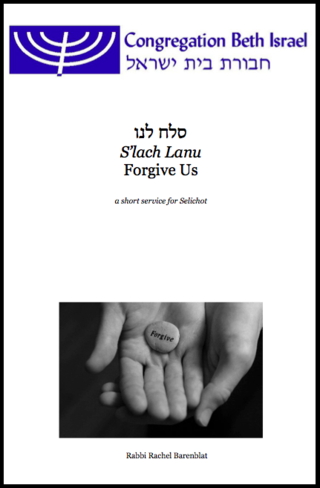Rachel Barenblat's Blog, page 117
September 8, 2015
#blogElul 24: Hope
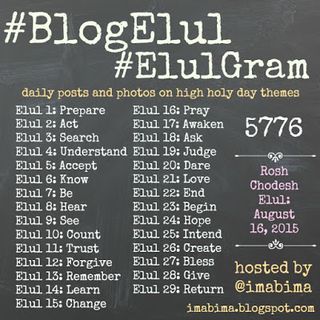
That after brokenness
comes repair.
That you'll always be
close as my heartbeat.
That those who sow in tears
will reap in joy.
That I never stop
knowing your beauty.
That I can live up
to your faith in me.
The couplet about sowing in tears / reaping in joy is inspired by Psalm 126.
I'm participating again this year in #blogElul, an internet-wide carnival of themed posts aimed at waking the heart and soul before the Days of Awe. (Organized by Ima Bima.) Read #blogElul posts via the Elul tag; last year's posts are now available in print and e-book form as See Me: Elul poems.

September 7, 2015
#blogElul 23: Begin
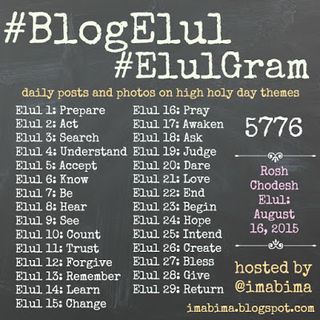
If I could ask the chrysalis
cosy in her custom house
she'd tell me how sweet it is
to be surrounded by her life's work.
And then one day she wakes
aware the time has come
to reveal the tender wings
she never knew she was growing.
What changed? What made her ready?
And when it's my turn
can I trust that I'll be safe
without the walls I built?
I'm participating again this year in #blogElul, an internet-wide carnival of themed posts aimed at waking the heart and soul before the Days of Awe. (Organized by Ima Bima.) Read #blogElul posts via the Elul tag; last year's posts are now available in print and e-book form as See Me: Elul poems.

September 6, 2015
When we reach the place of promise
The verses we just read instruct us that when we enter into the promised land, we are to offer the first fruits of the soil to God, and we are to recite before God "My father was a wandering Aramean..." -- the story of how we became slaves in Egypt and we cried out to God, and God brought us out from there with a mighty hand and an outstretched arm. Maybe those were instructions for specific people in a specific place and time. But I think they are also instructions for us now. Here's what I think they say:
When you reach the place of promise, stop and remember where you come from. When you reach the thing you've been waiting for and working for, stop and be thankful, and then honor the sacredness of your own story. When you reach the moment you've been walking toward or running toward or yearning toward or trudging toward, cultivate gratitude, and then tell yourself how you got there.
When you finally "get there" -- wherever "there" is for you: when you make it to Shabbat after a hard week, or when you make it to Rosh Hashanah after a long year, or when you make it to the day when you reunite with a beloved who has been far away, or when you realize that what you yearn for is already yours -- remember the hardest part in your personal story, the narrow place, the Mitzrayim when your heart felt squeezed and your spirit thirsted for waters you weren't sure where to find.
Even when we reach the place of promise --the time we've been waiting for, the internal spaciousness which is the opposite of Mitzrayim -- Torah calls us to remember our own times of constriction. Maybe that's because times of constriction come and go in every life, and Torah wants us to inscribe on our minds and hearts the truth that every constriction can lead to a new place of openness. If we're willing to do the work, every constriction can be a contraction toward a new beginning.
Maybe it's because our stories make us who we are, and the only way to fully reach the place of promise is to bring all of who we've been. Even the parts which were hard. Even the things about ourselves with which we struggle. Only when we bring our whole selves -- including the parts of us which ache or cry out; including our own wounds -- can we reach the place of promise. The place of promise is always open to us. Are we ready to gather the scattered parts of ourselves and come home?
This is the d'var Torah I offered yesterday at my shul for parashat Ki Tavo.

#blogElul 22: End
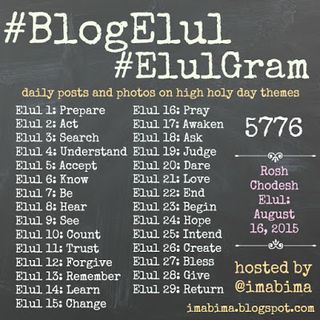
I'm the kid
who saved the last chocolate
until it turned pale and chalky
rather than finish the box
and admit that something sweet
was over.
I know every end
is a beginning, but
the leap of faith terrifies.
I have to trust
that this abundance
isn't all I'll ever get.
I'm participating again this year in #blogElul, an internet-wide carnival of themed posts aimed at waking the heart and soul before the Days of Awe. (Organized by Ima Bima.) Read #blogElul posts via the Elul tag; last year's posts are now available in print and e-book form as See Me: Elul poems.

September 4, 2015
Selichot
The Days of Awe begin at the next new moon. Our journey into those awesome days intensifies tomorrow night, and we'll kick off the "high holiday season" at my shul, with the service called Selichot. Selichot means "pardons," and is the name our tradition gives to a set of poems and prayers designed to help our hearts experience teshuvah, repentance or return (in the sense of returning-to-God or re/turning ourselves in the right direction again.) Some people say the selichot prayers every day during Elul. And a lot of congregations have a special service dedicated to Selichot, as we do.
It's customary to do this on a Shabbat evening near, but not too near, to Rosh Hashanah. Since the New Year begins next weekend on Sunday night, next Shabbat would be too close -- we wouldn't have time for the experience of the Selichot to resonate in us -- so we'll do it tomorrow night.
This may be my favorite service of the year. We begin with havdalah, which I love dearly. (And I have recently come to feel especially attached to the opening prayer, which proclaims evtach v'lo efchad, I will trust and will not be afraid.) Then we dip into some of my favorite prayers of the Days of Awe -- prayers whose words, and whose melodies, speak to me deeply. We'll sing some prayers which I hope will stimulate the part of our hearts which responds to music; we'll read some poems which I hope will stimulate the part of our hearts which responds to words. And midway through the service we'll pause for a short writing exercise.
People will be invited to write down on index cards, anonymously, places where they've (we've) missed the mark in the last year. Things for which they (we) seek forgiveness as the Days of Awe approach. I'll collect those cards, and will leave the cards and pencils and a basket for collecting them out in the synagogue lobby for about ten days so those who don't make it to Selichot services can still participate. And then I'll use the words on those cards to craft a personalized Al Chet prayer for Yom Kippur morning, co-written by our community, expressing the things for which our hearts most seek forgiveness and release.
If you're local to western Massachusetts, you're welcome to join us at 8pm at Congregation Beth Israel tomorrow night. And if you would like to dip into the prayers and songs of Selichot tomorrow night by yourself, the pdf file of our service is here for you.

#blogElul 20: Dare
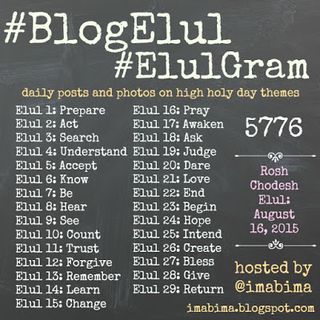
So much I've left unsaid.
Not with you -- never with you --
but with everyone else.
If I stop self-censoring
what might I lose?
Who might I hurt?
If I don't express my true heart
haven't I already lost?
I'm participating again this year in #blogElul, an internet-wide carnival of themed posts aimed at waking the heart and soul before the Days of Awe. (Organized by Ima Bima.) Read #blogElul posts via the Elul tag; last year's posts are now available in print and e-book form as See Me: Elul poems.

September 3, 2015
Whatever gets in the way...
When I was an MFA student at Bennington many years ago, I had a poetry mentor named Jason Shinder who used to say, "Whatever gets in the way of the work, is the work."
He was talking about poetry, of course...Whatever is getting in the way of my creative life doesn't have to be an obstacle. Seen from a different vantage, it's a doorway in.
I've come to see this as a profound spiritual teaching, too...
That's from the beginning of my latest piece for The Wisdom Daily: The Gift of Recognizing What's In Your Way. I hope you'll click through and read!

#blogElul 19: Judge
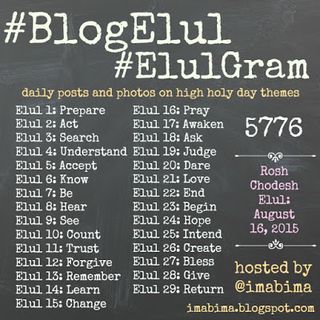
With my heart in my hands
I approach the bench.
No: my heart
is in your hands.
You read me
like a book:
what I've said
and left unsaid
where I stumbled
over my own tangles
and where I shone
like the light of creation.
Only one thing do I ask,
this alone do I seek:
let me dwell
in your house, in your heart.
Please don't ever
hide your face from me.
The final three stanzas are references to psalm 27, the psalm which tradition invites us to read daily at this season.
I'm participating again this year in #blogElul, an internet-wide carnival of themed posts aimed at waking the heart and soul before the Days of Awe. (Organized by Ima Bima.) Read #blogElul posts via the Elul tag; last year's posts are now available in print and e-book form as See Me: Elul poems.

September 2, 2015
#blogElul 18: Ask
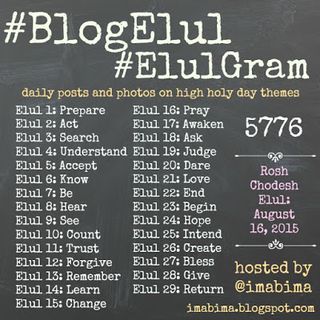
Will it ever get easier?
Some days a black hole
takes up residence
in my ribcage
and swallows me
until all that's left
is yearning for you.
The ache threatens
to wash me away
but I can't hate it
because it points
toward you.
My heart, incomplete --
a piece of me is tucked
into your pocket.
Your heart, incomplete --
mine is enlivened
by a piece of you.
I'm participating again this year in #blogElul, an internet-wide carnival of themed posts aimed at waking the heart and soul before the Days of Awe. (Organized by Ima Bima.) Read #blogElul posts via the Elul tag; last year's posts are now available in print and e-book form as See Me: Elul poems.

September 1, 2015
#blogElul 21: Love
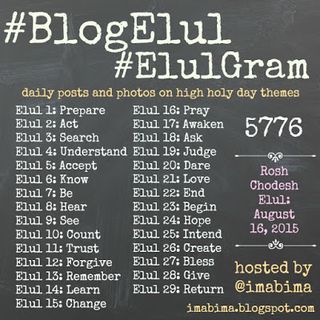 Are you surprised to see prose today after so many days of poetry?
Are you surprised to see prose today after so many days of poetry?
I thought about writing a love poem. "Love" and "poetry" go together like apples and honey, right? But I think that all of the Elul poems I've written, this year and last, are at their root love poems.
Elul is the month whose name forms an acronym for Ani l'dodi v'dodi li, "I am my Beloved's and my Beloved is mine." This whole month is about cultivating love between us and our Beloved.
Nava Tehila's Lach Amar Libi is a love song. God calls to us to seek God's face. In return we affirm that we seek the divine Presence, we seek to connect face-to-face and heart-to-heart with love.
The liturgy we've inherited for the Days of Awe makes frequent use of the metaphor of God-as-Judge. The Days of Awe call us to discern who we are, to judge our own selves, to notice where we've gone wrong and how we might make amends. But we can only do that when we know we are loved.
It's because we spend this month steeping in love -- our love for God; God's love for us -- that we can face the hard work of judging ourselves, the hard experience of standing before God and knowing that everything we are, everything we have done and not-done, everything we have thought and felt, is written in the book of our lives by our own hands and we need to take responsibility for all of it.
The qualities of ahavah and yir'ah, love and awe (or love and fear), go hand in hand. Our qualities of love and awe go together like God's qualities of mercy and judgement: they are two sides of one divine coin. In order for me to feel safe going deep into the awe and fear and discernment embedded in the High Holidays, I need to spend Elul reminding myself that I am loved by an unending love.
And so are you.
No matter what.
I'm participating again this year in #blogElul, an internet-wide carnival of themed posts aimed at waking the heart and soul before the Days of Awe. (Organized by Ima Bima.) Read #blogElul posts via the Elul tag; last year's posts are now available in print and e-book form as See Me: Elul poems.

Rachel Barenblat's Blog
- Rachel Barenblat's profile
- 6 followers


